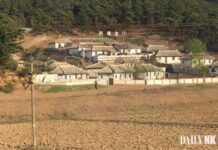Shenyang, China — Overall average prices in North Korea have doubled since the end of last year.
Sources say that the reason behind the price rises is insufficient supplies within North Korea coupled to the effect of relatively strict crackdowns on the smuggling of goods in from China.
Rice is now reportedly 2,000 won per kilo (as of the 11th). Late last year it was between 900 and 1,000 won.
In late January, rice even reportedly reached 3,000 won in some areas. A source explained why, “There were rumors that state rice stores were empty, because even those people who are targeted for state distribution didn’t get any food in late January in some areas.” So, he went on, “Around that time, wholesalers colluded to fixed the price at 3,000 won.”
Thereafter, the source said, “Now, rice has dropped to around 2,000won,” explaining that, “When the price went up, the supply increased, so the price was amended again.” According to the latest research by The Daily NK, rice is now selling for 2,000 won in Pyongyang and Shinuiju, while in Nampo it is 1,900 won and 1,800 won in Hyesan..
Corn, which generally costs half as much as rice, now sells for between 1,000 and 1,200 won, which is exactly double the price at the end of last year. Pork, which sold for 3,500 won per kilo in December last year, now goes for 6,500 won.
Sugar is even worse, having tripled: late last year it was 1,700 won per kilo, but has now reached more than 5,000 won. Red chilli pepper powder has also gone up from 7,000 won per kilo to 15,000 won.
Even though the North Korean authorities emphasized improving light industrial and agricultural production in the New Year’s Common Editorial, in reality the country is experiencing serious inflation due to a lack of goods in the markets. Therefore, it seems inevitable that people’s lives will get harder.
[imText1]


















